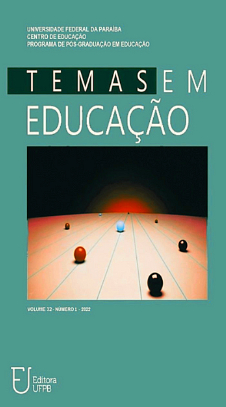Una experiencia para el desarrollo del razonamiento lógico-matemático a través de la literatura infantil
DOI:
https://doi.org/10.22478/ufpb.2359-7003.2023v32n1.64160Keywords:
Educación Infantil, Razonamiento Lóco-Matemático, Literatura InfantilAbstract
The goal of this research is to analyze a teaching intervention for the development of logico-mathematical relationships through children's literature. In this qualitative study we develop a teaching experiment to deep in the area of mathematics in early education. The design contemplates three classroom interventions with the participation of three students of 4- to 6-year-old. These interventions are planned considering the learning of logical structures, specifically with respect to classification, ordering and seriation; and the role of children's literature and its use in math classes. The results show characteristics that can be a contribution to the educational community, since they provide pedagogical guidelines that include strategies, materials and activities to be used and adapted to different educational contexts in order to develop logico-mathematical relationships through literature.
Downloads
References
ALSINA, Á. Hacia un enfoque globalizado de la educación matemática en las primeras edades. Números. Revista de Didáctica de las Matemáticas, La Laguna, nº 80, p. 7-24, 2012.
ÁLVAREZ, C. La enseñanza de matemáticas a través de los cuentos en la Educación Infantil . Tesis de Grado—España: Universidad de Cantabria, 2016.
BETANCOR, P. Utilidad de los cuentos en el aprendizaje de las matemáticas. Tesis de Grado-España: Universidad de la Laguna, 2018.
CASTRO-RODRÍGUEZ, E.; CASTRO, E. Pensamiento lógico-matemático. (E. Castro, E. Castro, Eds.). Enseñanza y aprendizaje de las matemáticas en Educación Infantil. Pirámide, Madrid, 2016.
CONFREY, J. The Evolution of Design Studies as Methodology. In: SAWYER, R. K. (Ed.). The Cambridge Handbook of the Learning Sciences. Cambridge University Press, 2006. p. 135–152.
DEL RÍO, A.; RUÍZ-HIDALGO, J. Lenguaje lógico-matemático. In: CASTRO, E.; CASTRO, E. (Eds.). Enseñanza y aprendizaje de las matemáticas en Educación Infantil. Pirámide, 2016. p. 67-85.
HAURY, D. L. Literature-Based Mathematics in Elementary School. ERIC Clearinghouse for Science, Mathematics, and Environmental Education. Digest EDO-SE-01-08. Dec 2001. Disponível em: https://www.govinfo.gov/content/pkg/ERIC-ED464807/pdf/ERIC-ED464807.pdf
KUCKARTZ, U. Qualitative text analysis: A systematic approach. In: KAISER, G.; PRESMEG, N. (Eds.). Compendium for early career researchers in Mathematics Education. Cham, Springer, 2019. p. 181-198.
LARGO, N. Matemáticas a través de los cuentos en educación infantil. Tesis de Grado-España: Universidad del País Vasco, 2018.
MARÍN, M. El valor del cuento en la construcción de conceptos matemáticos. Números: Revista de didáctica de las matemáticas, La Laguna, n. 39, p. 27–38, 1999.
MARÍN, M. Contar las matemáticas para enseñar mejor. Matematicalia: revista digital de divulgación matemática de la Real Sociedad Matemática Española, v. 3, n. 4, p. 5, 2007.
MARÍN, M. Pensamiento matemático y cuentos en Educación Infantil. Edma 0-6: Educación Matemática en la Infancia, Madrid, v. 10, n. 1, p. 30–44, 5 jun. 2021.
MOLINA, M. et al. Un acercamiento a la investigación de diseño a través de los experimentos de enseñanza. Enseñanza de las Ciencias, Valencia, v. 29, n. 1, p. 75–88, mar. 2011.
PIAGET, J. La teoría de Piaget. Infancia y Aprendizaje, Madrid, v. 4, n. sup2, p. 13–54, 1 jan. 2014.
PIAGET, J.; INHELDER, B. Génesis de las estructuras lógicas elementales: clasificaciones y seriaciones. México, Biblioteca pedagógica Guadalupe, 1967.
PORRAS, J. La literatura infantil, un mundo por descubrir. Madrid, Visión Libros, 2011.
SÁNCHEZ, M. C.; REVUELTA, F. El proceso de transcripción en el marco de la metodología de investigación cualitativa actual. Enseñanza, Madrid, v. 23, p. 367–386, 2005.
SANZ, I.; ARRIETA, M.; PARDO RUIZ, E. Por los caminos de la lógica: lógica y conjuntos en EGB. Madrid: Síntesis, 1988.
URDANETA, J. Cuenta que te cuento. Maracay, Venezuela: Playco Editores, 2008.
Downloads
Published
How to Cite
Issue
Section
License
Copyright (c) 2022 Revista Temas em Educação

This work is licensed under a Creative Commons Attribution 4.0 International License.
Authors who publish in this journal agree to the following terms:
. Authors retain the copyright and grant the journal the right to first publication, with the work simultaneously licensed under the Licença Creative Commons Attribution that allows the sharing of the work with acknowledgment of authorship and initial publication in this magazine. . Authors are authorized to assume additional contracts separately, for non-exclusive distribution of the version of the work published in this journal (eg, publishing in institutional repository or as a book chapter), with acknowledgment of authorship and initial publication in this journal.
. Authors are permitted and encouraged to publish and distribute their work online (eg in institutional repositories or on their personal page) at any point before or during the editorial process, as this can generate productive changes, as well as increase impact and citation of the published work (See O Efeito do Acesso Livre).



















